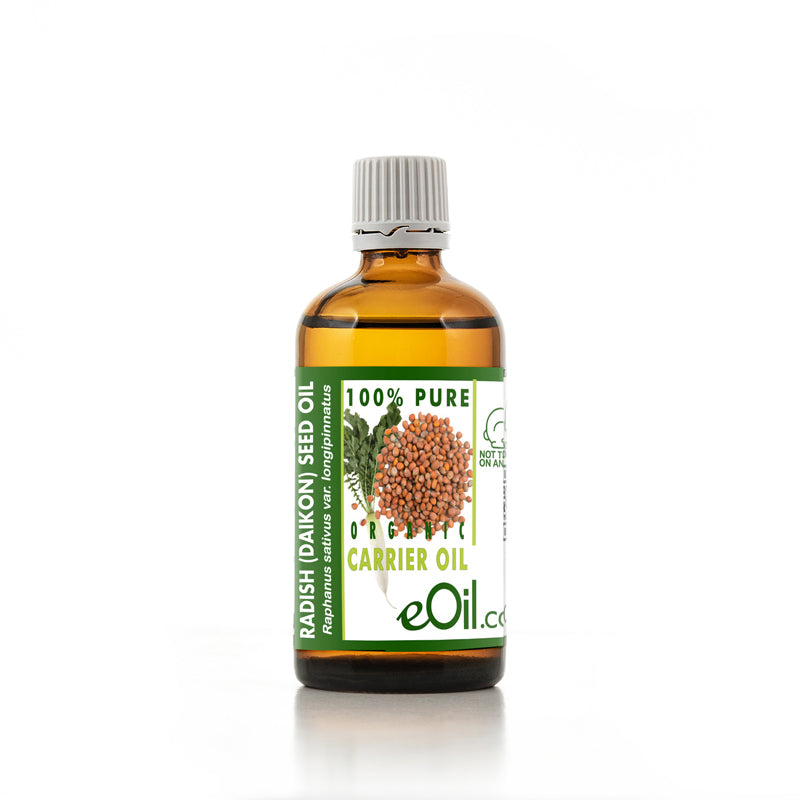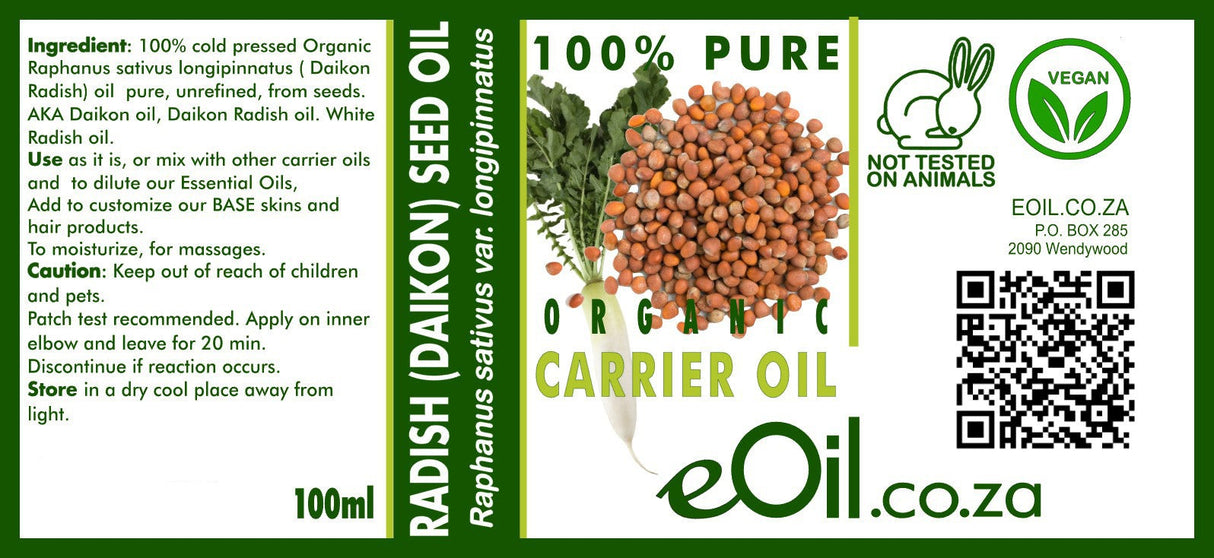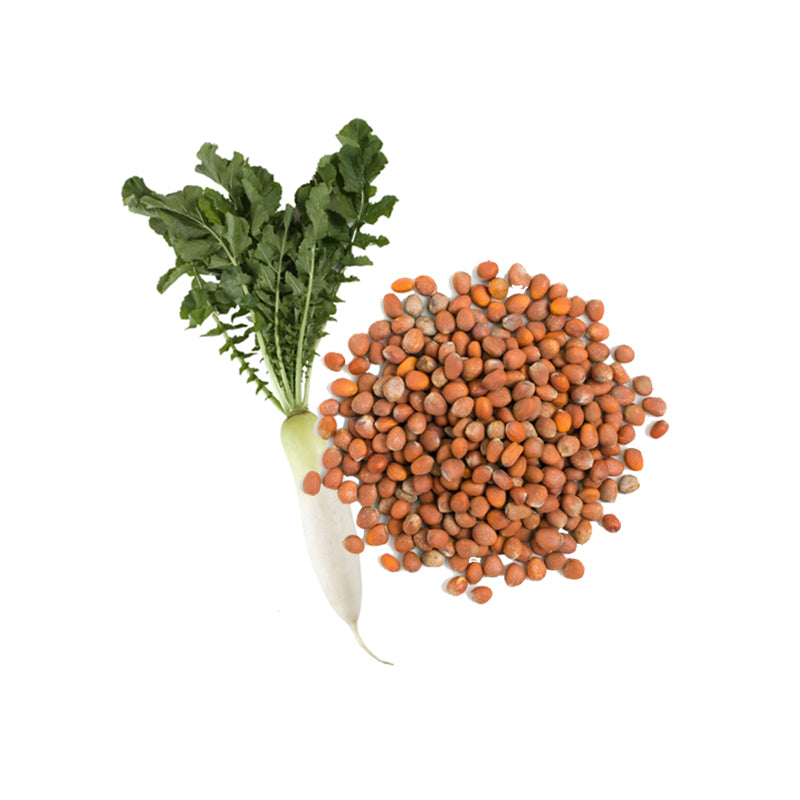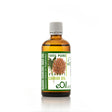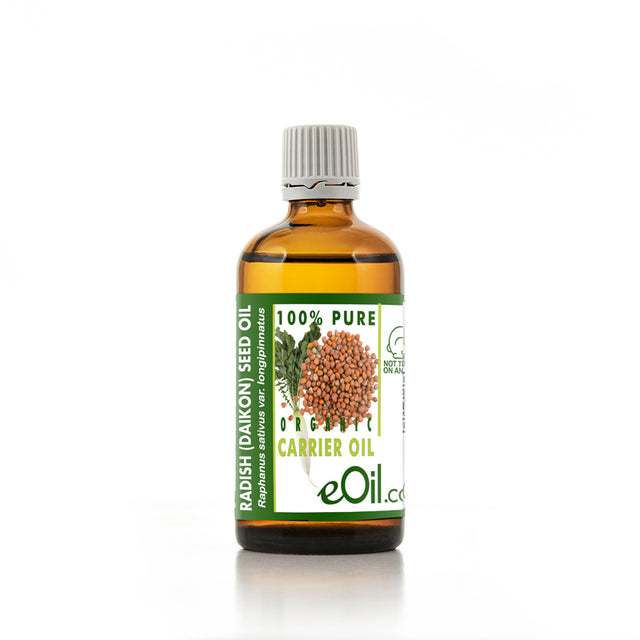Daikon Carrier Oil Organic
Daikon Carrier Oil Organic - 100 ML is backordered and will ship as soon as it is back in stock.
Description
Description
Daikon Radish Seed Organic Carrier Oil (Raphanus sativus) is a lightweight, fast-absorbing oil, cold-pressed from organic seeds.
Renowned for its silky, non-greasy texture, it nourishes skin and hair, supports moisture balance, and adds natural shine.
Perfect for all skin and hair types, 100% pure and additive-free
IDENTIFICATION
INCI Name: Raphanus sativus (Radish) seed oil
SYNONTYMS: Raphanus sativus Longipinnatus, Raphanus raphanistrum sativus (L)
CAS Number: 84775-94-0
SKU code:
EXTRACTION METHOD: cold pressed
PARTS USED: seeds (non-GMO)
ORIGIN: India
COMMON NAMES: Daikon radish oil, White radish seed oil, Winter radish seed oil, long white radish, Japanese radish, Mooli, Oriental radish seed oil.
APPEARANCE: clear yellow to gold fluid oil.
ODOUR NOTE: light, characteristic, slightly spicy/peppery aroma.
QUALITY: 100 % pure, unrefined (filtered) and natural carrier oil.
STORAGE CONDITIONS: keep in a cool, dark place away from heat sources.
CAUTIONS: EXTERNAL USES ONLY.
COMPOSITION/ FATTY ACID PROFILE: 47.9 % ERUCIC ACID (C:22 OMEGA-9); 14.50 % LINOLEIC ACID (OMEGA-6); 11.20 % OLEIC ACID (OMEGA-9); 7.10 % 11-EICOSENOIC ACID (C:20 OMEGA-9); 5.52% PALMITIC ACID (C:16), GADOLEIC ACID (C:20-11), STEARIC ACID (C:18); VITAMIN A, VITAMIN B6, VITAMIN C, VITAMIN E, VITAMIN K, FOLIC ACID, ZINC.
CAUTIONS: EXTERNAL USES ONLY. PLEASE NOTE: This cold pressed oil is unrefined.
Because of its rich composition in ERUCIC ACID, Daikon radish seed oil, like other unrefined pure seed oils from the Brassicaceae* family (Broccoli, Abyssinian crambe, Mustard) is RESERVED FOR EXTERNAL USES. For the same reasons and for safety principles, Radish seed oil is not recommended during pregnancy and while breastfeeding. Not recommended for uses/application for children under 6 years old.
REPORTED PROPERTIES
- COMEDOGENIC*: 1
- EMOLLIENT, MOISTURIZING, NUTRITIOUS
- ANTIBACTERIAL
- ANTI-INFLAMMATORY, CALMING
- REGENERATING & ANTIOXIDANT
- HAIR AND FOLLICLE CONDITIONING
*COMEDOGENIC SCALE (Causes clogging of pores) 0=NO, 1 to 2 = HARDLY, 3 to 4 = YES, 5= VERY
TRADITIONAL USES
- In wellbeing, Radish seed oil has been traditionally massaged to ease the symptoms of common cold and cough and to generally improve the immune system.
- In digestive and circulatory massages
- In anti-fungal creams.
- In anti-inflammatory creams, lotions balms for Dry to very dry, sensitive skin and face
- In soothing Body and face creams and lotions
- In After-Sun skin care
- In Pro-age, well-aging, anti-aging creams, serums.
- In products to maintain healthy hair, skin, scalp, and nails.
- In hair growth and follicles care products, hot oil baths and Hair treatments
- In anti-frizz Hair Styling products
- In Conditioners for dry, fragile hair.
- In conditioning Beard oils
- In Hand and cuticle care; In strengthening and anti-bacterial formulations for brittle nails, damaged and dry cuticles.
- In Skin and hair serums
- In Hair and Face masks
- In Facial oils and cleansers
- In dry “feel” Serums, In “Dry” oils or light body massage/ perfumed oil
- As a botanical alternative to silicones and esters.
HOW TO USE
This quick to absorb, non-greasy, non-sticky, stable oil can be used by itself.
But because of its lightweight and silicone-like texture, Radish seed oil is more often used as an ingredient, in combination with other heavier carrier oils or natural bases. It will easily fit in your own facial serum mixes (will not clogs pores) or in your hair, scalp and beard serums, shampoos, or conditioners without adding weight or stickiness.
You can use up to 75 % of radish seed oil for a taming nourishing finishing hair serum
Use radish seed oil up to 45% in your total formula for a body or beard oil
Use radish seed oil up to 20% for a facial serum
Use radish seed oil at 16 % in a ready to use, fragrance free natural base (4ml radish oil/ 100ml base cream, shampoo, liquid soap, …)
HAIR CARE: ++++
For Curly Hair, Curly Hair, Wavy Hair; For Dry Hair, Brittle Hair, Damaged Hair, to limit hair loss, to fortify thin hair
Radish seed oil is a reference oil for hair and scalps treatments, often described as a conditioner, with a texture comparable to silicones. Helps repair the structure of dry curly, wavy hair. Reduces statics often associated with this type of hair and help avoid frizzes. Strengthens hair follicles, promotes healthy growth and has purifying properties. Nourishes and facilitates detangling while bringing shine and softness. Provides an amazing shine to the hair.
- Combine with: Amla Oil, Oat kernel Oil, Castor oil, Camellia oil, Abyssinian Oil, Argan oil, Kakadu plum oil, Pequi oil… to create your own shampoo, conditioners, masks, or serums.
- Add up to 1% of essential oil(s) if desired: Ylang-Ylang to regulates sebum secretion while cleaning the hair. to combat hair loss and strengthens brittle hair. Rosemary…
- Use in or as a mask before shampoo applied to tips and lengths. Leave on for several hours or even a whole night and then shampoo.
- Apply a few drops directly on wet hair or in your conditioner cream, lotion after shampoo.
- In an anti-frizz, nourishing, strengthening, taming hair serum.
- Add a few drops to you’re a neutral organic hair wash base to create a strengthening shampoo
SKINCARE+++
For Dry Skin, Redness tendencies, inflamed, damaged irritated skin conditions, eczema, and psoriasis, to calm, restore, strengthens, purify ; For Mature Skin To reduce the appearance of wrinkles, to promote collagen building; For Chapped lips, For soft, brittle nails Dry, damaged cuticles :To maintain healthy nails, To nourish nails in depth, to strengthen and thicken brittle, soft nails; to make them shinier, To soften, nourish cuticles (more flexible) and promote healthy regrow of nails.
Contains mostly monounsaturated fatty acids but also Vitamins, and major antioxidants. Particularly suitable for dry, very dry skins, or fragile, compromised, sensitive skins with redness tendencies. To provide care and protection. This dense but lightweight carrier oil keeps the skin well hydrated.
- Combine with Shea oil, Jojoba Oil or with other light carrier oils like Raspberry seed (for skin soothing serums). Baobab or Shea Butter (very nourishing); Hemp seed oil, Calendula oil, Apricot Kernel Oil (For sensitive, reactive skins), with Rosehip, Prickly Pear, Sea buckthorn, Carrot carrier oil (for mature, maturing skins), with Camellia or Castor oils (For soft, brittle nails, dry cuticles)
- Add essential oils (Optional): to care for wrinkles and to promote collagen building for maturing skin care, you can add a few drops of Rose Geranium essential oil (1% max), Helichrysum Italian or Lavender to help repair chapped lips.
- Massage a few drops morning and evening on your skin. Apply to dry cuticles and massage several times a week.
- Apply 1 to 2 drops of radish seed oil on each nail, then massage until penetrated. Repeat 2 to 3 times a week for better efficiency.
SHORT DESCRIPTION - INTERESTING FACTS
From the same family and with a similar profile to that of broccoli oil, minus the smell, Radish seed oil offers a lot of benefits for both skin and hair. You can naturally use it in application on dry skin or on frizzy hair, curly,
Our Raphanus sativus (radish) seed oil is a special, stable, cold-pressed virgin oil with a discreet, spicy aroma and a smooth, natural silicon-like texture. It is well suited to the care of mature or very dry, damaged skins. It hydrates and nourish dry, difficult to tame, hair with frizz tendencies and is also a favourite treat for beards, scalps.
This quick to absorb, non-greasy, non-sticky, stable oil can be used alone to moisturize body and hair. Because it is lightweight it will find its place in your own facial serum combinations (will not clogs pores) or in your hair, scalp and beard serums, shampoos, or conditioners without adding weight or stickiness.
Unrefined, our Radish seed oil present a very interesting combination: it is very high in rare nutritious unsaturated omega-9 fatty acids, it has compounds that helps protect the skin against sun damages (sulphur compounds- sulforaphane), This plant oil also contains potent antioxidants known as flavonoids,
it promises a more natural alternative to silicones and emollient esters these ingredients for adding slip, good absorption, and a non-oily feel to skin and hair care products.
Description: Raphanus sativus originates in Asia but can be found growing all around the world. It is an edible root vegetable with roots that grow up to 2.5 to 7 cm long and has foliage ranging from 13 to 60 cm tall.
Radish Seed Carrier Oil is rich in nutrients and contains unsaturated fatty acids that help replenish and strengthen the skin's moisture barrier and is ideal for personal care products and cosmetic formulations.
Absorbs quickly into the skin, leaving a slightly oily feeling. Radish, scientifically Raphanus raphanistrum is an edible root vegetable that belongs to the family Brassicaceae which have been domesticated in pre-Roman times in Europe. The oil is obtained by cold pressing the seeds of Radish. The seeds could be obtained by drying fruits and rubbing and cleaning all the impurities. The seeds are again dried and could be used to extract oil which is used to assist the functions of body. This oil has unique fatty acid composition that is similar to the silicone which is found in shampoos. It has emollient properties that make it easily penetrable to the skin. It is a perfect moisturizer for skin that makes the skin soft and supple. This oil is also used in personal care formulations, cosmetic application and hair formulations.
History
It was believed to be originated in South East Asia and was spread to the world. It is used for cooling purposes. Radish is commercially grown in Korea, Japan, Texas, China, California and Philippines. The Radish was used by Greek in 3rd century and Roman agriculturists in 1st century AD.
Health Benefits of Radish seed oil
This oil is used to maintain healthy hair, skin, scalp and nails.
It is used to nourish skin and manage hair.
It is helpful for brittle nails.
It smoothens the hair follicles and provides a glowing skin.
It helps to treat jaundice.
It is also used for blood purification.
It is used for the prevention of signs of aging by eliminating damage caused by free radicals.
It is useful for stomach problems and also promotes circulation.
It is also used to treat fungal infections.
Radish seed oil facts
Radish seed oil is clear to golden in color and is odorless. It is used as a substitute for silicone in skin care and hair products. It could be used as a serum for skin, hair and nails. It absorbs in skin quickly and provides glow to the skin. If used as a hair serum it smoothens the hair follicles and makes it manageable. This oil is a triglyceride that has unusual combination of C20, C18 and C22 fatty acids. Being an emollient it reaches the lower layers of skin.
MORE INFO
The fresh crunchy Radish roots, its nutritious leaves and seeds have a long, documented, historic place in human diet, and are still consumed all over Europe, America, and Asia. Close cousin to the horse radish, the roots and leaves have in the past been considered a hot spice, used in health preparations, fresh or infused, to alleviate liver and digestive ailments, as a natural diuretic and depurative stimulant. The radish root was recommended in decoctions in support of cardiovascular disease, to help relax the nervous and muscular systems and promote better sleep. Studies on radish root extract show powerful antimicrobial activities that may explain its traditional uses for fever and cold symptoms, or to relieve breathing difficulties and coughs.
Our radish oil is cold pressed from the seeds of one of the very mildly flavored Oriental radishes, called Daikon radish, winter radish, white radish, or Japanese radish.
Daikon radish are extremely popular in Japanese, Chinese and Asian cuisine. The root looks like a large white carrot and is commonly eaten raw, cooked (in miso soups), or pickled. Not only tasty and refreshing, Daikon radish is also low in calories, rich in vitamin C, and is often offered in these countries after an heavy or fried meal, to promote a smooth digestion.
(*) About Erucic acid in vegetable/carrier oils
Erucic acid is a long-chain, monounsaturated (C22:1) fatty acid, found mainly in the seeds of plants belonging to the Brassicaceae family such as rapeseed, mustard, broccoli, and radish. The seeds are cold pressed or extracted to obtain a virgin oil.
In these seed oils, erucic acid represents around 40 to 50% of their fatty acids total.
Erucic acid has many interesting properties for health. However, studies on rats, have shown an accumulation of fats, in those animals’ hearts, following long-term, chronic, high ingested doses of this fatty acid.
Consequently, the erucic acid content of oils intended for general human consumption (ingestion, cooking, salads…) and especially in young children food stuffs, is strictly monitored and limited to less than 0.5%.
As a result, new selected varieties of crops have been created, to obtain oils without or with very little erucic acid, that are suitable for consumption (As with the Rapeseed variety "00" (Canola) grown in Europe).
Our Daikon radish seed oil is obtained from the original types of crops, rich in erucic acid, and keeps all its protective, balancing, softening, soothing, regenerating, enveloping properties for skin and hair. It is reserved for external applications.
CAUTION
Do not use during the first 3 months of pregnancy / breastfeeding
Keep out of reach of children and pets.
As a general rule, always perform a skin patch test before using your essential oils for the first time.
Due to the natural origin of our products, some ingredients may contain trace proteins or allergens, especially in unrefined oils.
We strongly recommend performing a patch test on a small skin area 48 hours before full use to check for sensitivities.
Always dilute essential oils appropriately and follow our recommended usage guidelines to ensure safe application.
If you experience any irritation or allergic reaction, discontinue use immediately and consult a healthcare professional
For more detailed information, please go check this LINK TO Instructions of use essential oils page
DO NOT USE UNDILUTED and SEEK MEDICAL AND SPECIALIST ADVISE WHEN IN DOUBT.
SEE OUR PAGE ON PRECAUTION - HOW TO USE ESSENTIAL OILS SAFELY

Daikon Carrier Oil Organic - 100 ML is backordered and will ship as soon as it is back in stock.

